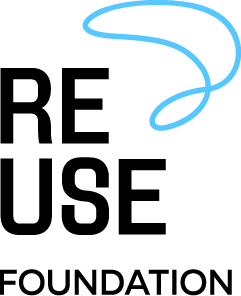Featured
INDUSTRY ATTEMPTS TO SELF-REGULATE PLASTIC USE AND MANAGE THE PLASTICS CRISES ARE FAILING |
|
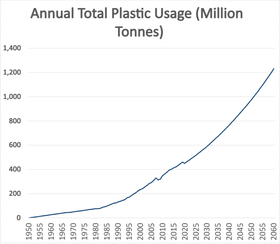
|
Concern about the environmental and health impacts of plastic continues to grow but industry efforts to self-regulate plastic usage are failing. Total plastic production and usage continues to rise and is expected to roughly triple by 2060. Just 9% of plastic is currently recycled and by 2060 OECD expects it will still be only 17%, the rest goes to landfill, gets burnt or escapes to the environment.
The main frameworks regulating plastic use are The Plastics Pact Network, convened by the Ellen MacArthur Foundation and WRAP and the Global Commitment, led by the Ellen MacArthur Foundation, in collaboration with the UN Environment Programme, that has “united more than 1,000 organisations behind a common vision of a circular economy for plastics” and boasts companies representing 20% of all plastic packaging produced globally committed to ambitious 2025 targets to help realise that common vision. Unfortunately, both frameworks are deeply flawed and neither contains a commitment to reduce or even limit plastic usage, allowing users to increase usage unabated. Since the Global Commitment framework was introduced in 2018, signatories have overall increased plastic usage by over 50 million tonnes. In place of porous and voluntary targets REUSE Foundation believes in binding regulation to manage plastic usage, along with a concerted effort to shift to reuse, which can quickly and greatly reduce plastic waste. Learn more about our work and support REUSE Foundation here.[Image Credit: © REUSE Foundation] |
Highlights
Empowering Indonesian MSMEs To Foster A Refill Lifestyle |
|
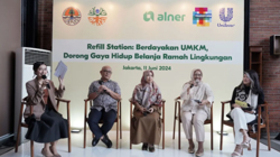
|
In celebration of World Refill Day, Alner, Unilever and EY highlighted the success of the Project TRANSFORM-Alner initiative, which has empowered 675 MSMEs to promote refill shopping, reducing 4,412 kg of plastic waste in one year. This project, supported by the UK Foreign, Commonwealth & Development Office, is pivotal in addressing Indonesia’s plastic waste issue, with the country producing 3.6 million tons of plastic waste annually. Key stakeholders discussed the refill concept as a vital solution for reducing plastic waste. Alner, a pioneer in refill packaging, uses a low-tech, cost-effective manual process to deliver refills directly to consumers, making it scalable and impactful. The project aligns with Unilever’s circular economy principles, aiming for less, better, and no plastic use. Project TRANSFORM-Alner has seen significant public interest, selling 77,624 liters of refill products and reducing single-use plastic. This success has also economically empowered MSMEs. Future goals include expanding to 1,500 points and further reducing plastic waste while continuing public education and collaboration with MSMEs.[Image Credit: © Unilever]
|
VIP Rewards For Recycling Plastic Bottles At UK Attractions |
|
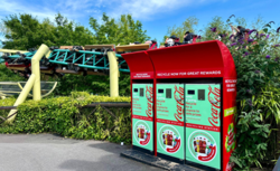
|
This summer, visitors to Merlin Entertainments UK attractions can win exclusive VIP experiences by recycling empty 500ml plastic bottles in designated reverse vending machines. Running from July 1 to September 6, 2024, the initiative encourages guests to recycle in exchange for prizes like behind-the-scenes tours at Warwick Castle, VIP circus experiences at Blackpool Tower and climbing Thorpe Park’s tallest rollercoaster, The Swarm. The vibrant vending machines are available across 11 popular attractions, including Alton Towers, LEGOLAND® Windsor and SEA LIFE aquariums. Guests can locate these machines through staff or the attraction's app. Each recycled bottle earns an entry to win the VIP prizes via a website link provided on the recycling receipt. Partnering with Coca-Cola for the third year, Merlin aims to raise awareness about plastic waste reduction and promote recycling. Coca-Cola Europacific Partners supports this initiative as part of its broader commitment to a circular economy, with 500ml bottles now made from 100% recycled plastic. [Image Credit: © Coca-Cola Europacific Partners]
|
SC Johnson’s Method Brand Uses 100% Recycled Coastal Plastic Bottles |
|

|
Method is making all its clear plastic bottles from recycled recovered coastal plastic, sourced through a partnership between SC Johnson and Plastic Bank. To date, the SC Johnson and Plastic Bank partnership has recovered the equivalent of 3 billion bottles that are recycled and turned into consumer product packaging.[Image Credit: © PRNewsfoto/method]
|
Biffa Report Highlights Role Of Circularity In Reducing Plastic Waste |
|
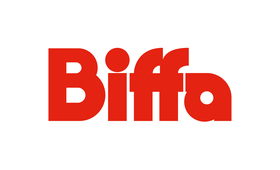
|
Standardizing plastic packaging materials across the UK could divert up to 0.8 million tonnes of plastic waste from landfills by 2029, according to Biffa's report, “The UK Journey to Circularity.” This involves designing products for easier recycling by using consistent materials, such as clear caps on bottles, which reduce contamination and facilitate recycling of both bottles and caps together. The report outlines a nine-point plan with achievable timelines for businesses, consumers, and the government. Key strategies include: Extending the Plastic Packaging Tax by increasing the mandated recycled content from 40 percent to 75 percent; a shift towards reusable packaging; 'consumer pays' schemes to incentivize responsible waste management; and investment in non-mechanical recycling technologies. Carla Brian, head of Biffa Project Partnerships, emphasized the need for new infrastructure and government legislation to support these changes. [Image Credit: © Biffa]
|
New Report Highlights Potential For Lawsuits Against Plastic Companies |
|
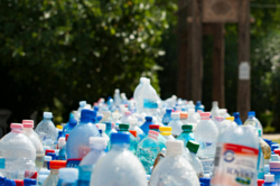
|
New research from the Center for International Environmental Law has detailed the burdens of plastic pollution of US cities and states and argued that plastic producers may have broken numerous laws. With Baltimore filing a claim against plastic manufacturers, the report has detailed how plastics companies knew the damage their products would cause and misled the public. Even today, plastics groups use Facebook advertising to get individuals to oppose anti-plastic measures. The Making Plastic Polluters Pay report exposes the impact on cities and states as well as equipping them with legal tools to hold plastic producers accountable.[Image Credit: © Mali Maeder from Pexels]
|
Evian Offers Water Refills At Wimbledon |
|
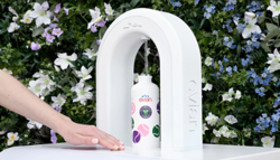
|
Following a successful pilot last year offering refills to tennis pros, Evian has piloted a £5 QR code at Wimbledon Tennis Tournament allowing fans to refill their water bottle at designated refill stations. Free tap water refills were also available, alongside a limited-edition Evian refill bottle available for £25, with refill stations found in six locations across Wimbledon for Evian’s first public refill scheme.[Image Credit: © IBM Corp., AELTC / Danone S.A. ]
|
The EU Single-Use Plastics Directive Alters Packaging Plans |
|
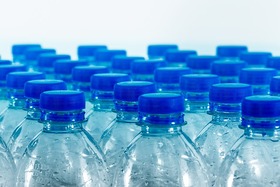
|
On 24th April, the European Parliament adopted the Packaging and Packaging Waste Regulation, amending the existing Single-Use Plastics Directive. This includes requiring beverage manufacturers ensure plastic caps attached to bottles, altering the definition of composite packaging to remove an exemption for packaging containing less than 5%, restricting single-use plastics in the hospitality sector, adding extended producer responsibility schemes obligations, and pushing companies to invest in R&D to comply with new regulations.[Image Credit: © Willfried Wende from Pixabay]
|
City To Sea Calls On Parties For Legally Binding Reuse Targets |
|

|
Charity City to Sea released an open letter to the Conservative, Labour and Liberal Democrat parties - backed by 35 NGOs, brands and celebrities - calling for a commitment to decrease reusable packaging. It calls for “legally binding, time-bound targets” including 30 percent of packing to be reusable by 2030 and a national transition to reuse and refill systems, with CEO Jane Martin calling for “a complete ban on single-use packaging”.[Image Credit: © City to Sea] |
No Billion Dollar-Plus Companies Are Meeting Plastic Waste Targets |
|
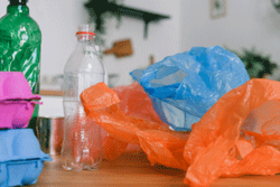
|
The 2024 Plastics Scorecard by As You Sow and Ubuntoo covers 225 companies from 15 industries. It ranks companies with revenue greater than one billion dollars on their plastic usage. 107 were awarded the lowest mark of F. Top of the list is Stella McCartney’s fashion house with a B+, but none got an A. Berkeley, California-based As You Sow urges action in six areas – recyclability, reduction, recycled content, recovery, reuse and extended producer responsibility.[Image Credit: © SHVETS production from Pexels]
|
Ho Chi Minh City Launches Campaigns Encouraging Inhabitants To Reduce Plastic Waste |
|
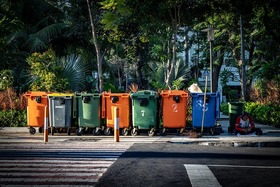
|
Ho Chi Minh City launched joint dissemination campaigns alongside businesses encouraging reduced use of single-use and non-degradable plastics, as well as plastic collection and recycling. The project promoting a circular plastic waste economy is sponsored by Coca-Cola Fund and operated by GreenHub, an NGO that successfully carried out a previous project in the Can Gio region. 27 businesses specializing in waste management will participate in the scheme, with Unilever Vietnam, Nestlé Vietnam and Coca-Cola Vietnam all announcing “ambitious” sustainable packaging goals. [Image Credit: © Niko Lienata from Pixabay]
|
Greenpeace Malaysia Promotes Reuse And Refill Policy Advancements |
|

|
As well as welcoming announcements from the Malaysian government addressing plastic pollution, Greenpeace Malaysia laid out policy frameworks to reduce plastic waste based on reuse systems. More than 80 percent of respondents to a survey back promoting reuse-based solutions, with Greenpeace calling for four pillars to the National Plastic Policy: implementation and scale up of reuse and refill systems, elimination of single-use plastics, banning of toxic materials in plastics and rejection of technologies that perpetuate single-use, pollution and greenwashing.[Image Credit: © Greenpeace International]
|
Blueland Founder Sarah Paiji Yoo Explains Her Journey To Refill Brand Blueland |
|

|
Sarah Paiji Yoo transitioned from a serial entrepreneur, specializing in marketing, to Blueland after the birth of her son and discoveries on microplastics in water. Her family went zero waste for two years before she founded BlueLand, a refillable home essentials business, the products of which are present in over a million homes. Yoo states her belief in the power of individuals, saying that the onus is on each of us to change our behavior, otherwise “the bigger levers of business or government are not going to change.”[Image Credit: © PRNewsfoto/Blueland]
|
Petaluma Initiative Tackles Plastic Waste With Reusable Cups |
|
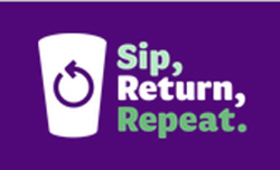
|
Starbucks, Coca-Cola, PepsiCo, Peet’s Coffee, Yum! Brands and other global and local brands have joined the Petaluma Reusable Cup Project, an initiative by the NextGen Consortium. Starting August 5, over 30 restaurants in Petaluma, CA, will replace single-use cups with reusable ones at no cost to customers, with numerous return points across the city. This project is the first of its kind in the US, aiming to make reusable to-go cups the standard across multiple restaurants, potentially reducing hundreds of thousands of single-use cups. Backed by the Center for the Circular Economy at Closed Loop Partners, the initiative focuses on creating return habits among customers, essential for the success of reuse systems and will run through November, collecting data on customer participation and environmental impact, providing a model for future reuse initiatives.[Image Credit: © Closed Loop Partners / The Center for the Circular Economy]
|
Loop’s Deposit Return Platform To Be Tested At Monoprix In Paris |
|
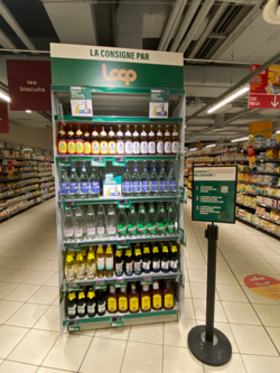
|
French convenience retailer Monoprix is testing the Loop deposit return solution in five stores in Paris as part of its efforts to reduce waste. The Loop deposit system gives consumers access to reusable, returnable packaging for everyday branded products, including Evian, Badoit, Lorina, Club Maté and William Peel, among others. Once the products have been consumed, customers can return the empty packaging to the shop to recover their deposits by dropping them off at a Loop collection point.[Image Credit: © Monoprix] |
Pernod Ricard Partners With ecoSPRITS On Circular Spirits Distribution |
|
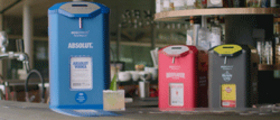
|
The spirits giants Pernod Ricard has entered a five-year global licensing agreement to use ecoSPIRITS to package and distribute its products. This is a circular packaging distribution scheme, which sees beverages transported in a closed loop packaging system in reusable 4.5 litre containers. This will hugely reduce overall carbon emissions and waste from secondary packaging materials. Beverages including Absolut vodka, Beefeater gin, and Havana Club rum are included in this distribution. [Image Credit: © Pernod Ricard]
|
The CIRCLE Alliance Supports Plastic Solutions Businesses In Developing Economies |
|
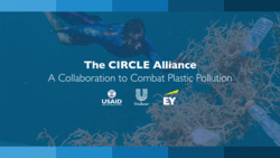
|
CIRCLE Alliance is a collaboration between Unilever, EY and USAID designed to combat plastic pollution, with a focus on businesses and women in India, Indonesia, Vietnam and the Philippines. The Alliance is the flagship public-private collaboration of USAID’s Save Our Seas Initiative and is supported by the EDGE fund and the GEEA fund, to reduce plastic waste and develop circular economies.[Image Credit: © United States Agency for International Development]
|
Farms Continue To Use Plastic Sheets Despite Evidence That It Harms The Soil |
|
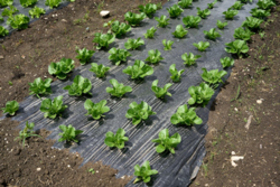
|
The use of plastic sheets to create greenhouse conditions for crops has been used in agriculture since the late 1940s, but this is far from ideal. ‘Plasticulture’ on farms is ultimately detrimental as it enters the soil as microplastics and affects soil quality, as well as being integrated into crop growth. The production of this ‘cheap and effective’ plastic to assist crop growth is also responsible for fossil fuel emissions. The author highlights the need to use plastic more sustainably and with a greater awareness of the damage it causes, as well as shifting agriculture practice away from plastic use. [Image Credit: © Steffen Lemmerzahl on Unsplash]
|
Henkel Ibérica Makes Sustainability Improvements |
|
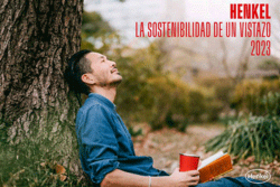
|
In Spain, the laundry company Henkel Ibérica, has reduced total CO2 consumption by 60 percent between 2010 and 2023, purchasing 89 percent renewable energy, using more than 25 percent recycled plastic, and installing 18,600 m2 of solar panels at its factory in Barcelona. 95 percent of the plant's plastic is already designed for recycling, with 89 percent of Henkel’s total plastics designed for recycling. [Image Credit: © Henkel Ibérica, S.A] |
Around 70 Percent Of UK Consumers Call For A DRS |
|
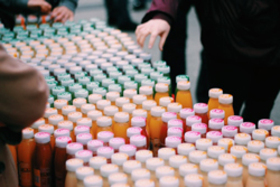
|
Environmental organizations are calling on all political parties in the UK to include a deposit return scheme for beverage bottles in their General Election manifestos. Such as scheme places a small deposit on the bottles at purchase, refunded to consumers who return the container for recycling. Existing schemes across Europe have achieved return rates ranging from 92 percent to 98 percent. A survey by Reloop identified support for the scheme among potential voters of all major UK parties: 77 percent of Conservative voters, 69 percent of Labour voters and 71 percent of Liberal Democrat voters. Although the DRS was announced by the UK Government in 2017, delays mean it will be implemented in October 2027 by the next Government. [Image Credit: © AJ Alao on Unsplash]
|
Researchers Find A Fungus That Can Degrade Floating Ocean Plastic Waste |
|

|
Researchers from the Royal Netherlands Institute for Sea Research discovered that the marine fungus Parengyodontium album can break down polyethylene plastic when exposed to UV light at a rate of 0.05% per day, converting most of it into CO2. This means the fungi can initially only degrade plastic floating in surface waters initially, limiting its contribution, given that significant amounts of different plastics accumulate in deeper. P. album is one of five marine fungi identified with the ability to degrade plastics, and scientists expect that other unknown species will also contribute, particularly in deeper parts of the ocean.[Image Credit: © NIOZ]
|
L'Occitane Partners With Others On PET Bottle From Enzymatic Recycled Plastic |
|
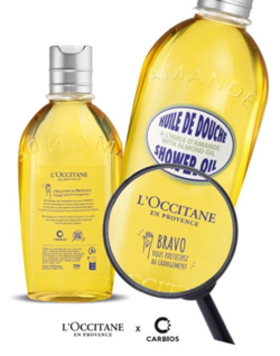
|
L’Occitane has partnered with biotech company Carbios and packaging firm Pinard Beauty Pack to create 100% PET bottles made from recycled plastics. Carbios developed an enzymatic depolymerization technique to recycle PET waste that cannot be processed with existing mechanical recycling technologies, while enabling bottle quality and transparency. This partnership will help L’Occitane achieve its goal of using post-consumer recycled PET materials for 100% of retail bottles by 2027, aligning with its aim to reduce reliance on fossil-based plastic. Carbios estimates this technique can reduce CO2 emissions by 57 percent by optimizing product circularity, reducing transport distances and integrating local collection and production systems. [Image Credit: © CARBIOS] |
New Survey Finds Gen Z Increasingly Skeptical Of Brand And Influencer Messaging |
|
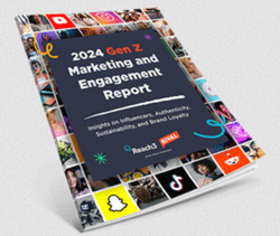
|
A survey of 18–27-year-olds in the US discovered that Gen Z is taking a more skeptical approach to online purchasing, with an decline in trust in influencers coinciding with increasing wariness over greenwashing, as well as shifting priorities towards affordability over sustainability in purchasing decisions. Also of note was the dominance of Instagram-related content influencing purchasing decisions over other social media options, as well as an increased emphasis on authenticity and trust. The survey was conducted by Rival Technologies, an AI-driven research firm and Reach3 Insights, a market-research company.[Image Credit: © Rival Technologies, Inc.]
|
Tesco Trials Schemes To Limit Avocado Packaging |
|
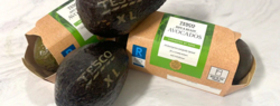
|
Tesco will trial two schemes to reduce single use plastic in avocado packaging. It is replacing plastic trays with cardboard containers and etching key information onto the avocado skin to replace barcode stickers. This is expected to avoid over 20 million pieces of plastic tray packaging and nearly a million plastic stickers annually, based on current sale statistics from Westfalia Fruit, Tesco’s main avocado supplier. Tesco sells around 70 million avocados a year, with demand up 15 percent in the last year. Trials will be conducted in 270 stores in south-east England and, if successful, will expand across all Tesco stores.[Image Credit: © Tescoplc.com]
|
